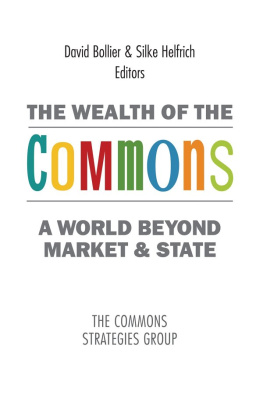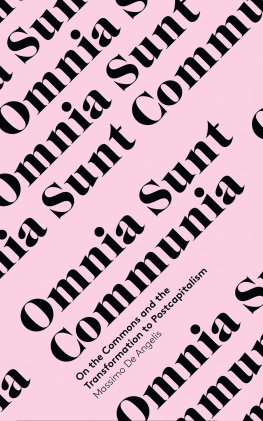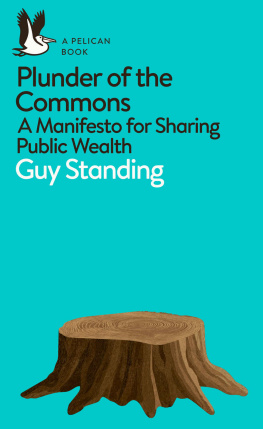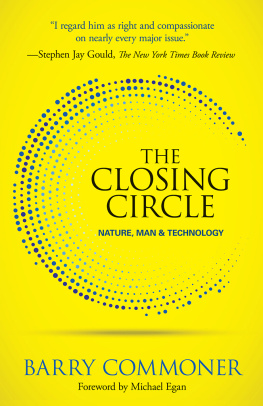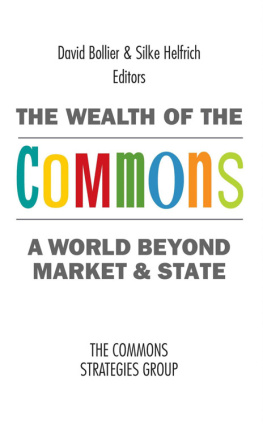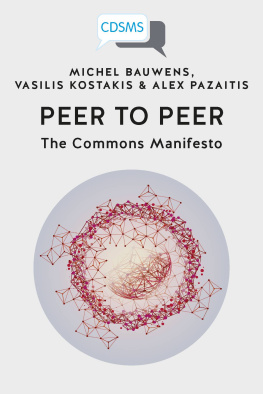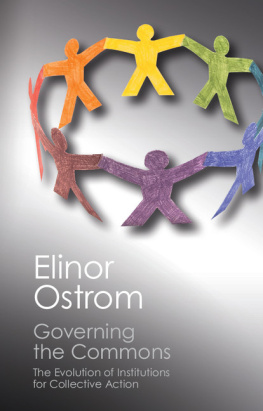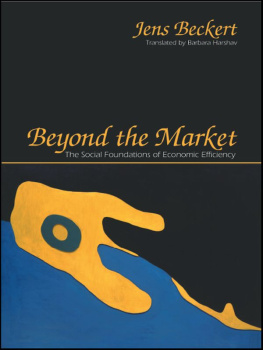Praise for Think Like a Commoner
The Commons is among the most important and hopeful concepts of our time, and once youve read this book youll understand why!
Bill McKibben, author Deep Economy
Think Like a Commoner is a brilliant, accessible, practical, path-breaking intellectual tour de force. A defining contribution to the New Economy movement and an essential read for everyone who cares about the human future. I expect to return to it as a basic reference for years to come.
David Korten, author, Agenda for a New Economy, board chair YES! Magazine, and co-chair, New Economy Working Group
The commons is truly the new paradigm, the missing third link for the reform of civilization. But the commons is not a thing, but above all the expression of a cultural revolution and of subjective changes. David Bollier has done a great job of explaining the importance of this great cultural shift.
Michel Bauwens, Founder, Foundation for Peer-to-Peer Alternatives
Our world is in need of reviving an ancient wisdom if it is to survive. David Bollier has a beautiful, bold but practical vision for our commons future and lights the path forward. I love this book!
Maude Barlow, National Chairperson of the Council of Canadians; international water activist
It probably surprises you to know that the wealth we own together as a commons is far more valuable than the wealth that we and corporations own separately. Corporations know this and have commercialized or taken control of what we the people own such as the public airwaves, the public lands, our genes and trillions of dollars of knowledge (eg. research and development) paid for by taxpayers for starters. For this and more you must read Bolliers brilliant distillation of the huge variety of commons and how we can take control of what we own in order to transform our economy for us, our posterity and the planet. Once you pick it up, youll tremble with the excitement of what we all own in the form of the commons that somehow escaped our notice in our years of formal education.
Ralph Nader, Consumer advocate and author, Unstoppable: The Emerging Left-Right Alliance to Dismantle the Corporate State


Copyright 2014 by David Bollier. All rights reserved.
This book is licensed under a Creative Commons Attribution-NonCommercial-ShareAlike 3.0 license. See creativecommons.org/licenses/by-sa/3.0/deed.
For more information, including citations and recommended readings for each chapter, go to thinklikeacommoner.com
Cover design by Diane McIntosh. Illustration iStock (ARTQC).
First printing January 2014.
New Society Publishers acknowledges the financial support of the Government of Canada through the Canada Book Fund (CBF)for our publishing activities.
should be addressed to New Society Publishers at the address below.
To order directly from the publishers, please call toll-free (North America) 1-800-567-6772, or order online at www.newsociety.com
Any other inquiries can be directed by mail to:
New Society Publishers
P.O. Box 189, Gabriola Island, BC V0R 1X0, Canada
(250) 247-9737
LIBRARY AND ARCHIVES CANADA CATALOGUING IN PUBLICATION
Bollier, David, author
Think like a commoner : a short introduction to the life of
the commons / David Bollier.
Includes index.
Issued in print and electronic formats.
ISBN 978-0-86571-768-8 (pbk.).ISBN 978-1-55092-559-3 (ebook)
1. Public goods. 2. Commons. 3. Capitalism. I. Title.
HB846.5.B64 2014 306.3 C2013-907692-1
C2013-907693-X
New Society Publishers mission is to publish books that contribute in fundamental ways to building an ecologically sustainable and just society, and to do so with the least possible impact on the environment, in a manner that models this vision. We are committed to doing this not just through education, but through action. The interior pages of our bound books are printed on Forest Stewardship Council-registered acid-free paper that is 100% postconsumer recycled (100% old growth forest-free), processed chlorine-free, and printed with vegetable-based, low-VOC inks, with covers produced using FSC-registered stock. New Society also works to reduce its carbon footprint, and purchases carbon offsets based on an annual audit to ensure a carbon neutral footprint. For further information, or to browse our full list of books and purchase securely, visit our website at: www.newsociety.com

For Jonathan Rowe (19462011), whose beautifully insightful writings about the mysteries of the commons remain an inspiration.

CONTENTS

W HEN MY SEATMATE on the airplane turned to me and abruptly asked, So what do you do? I replied that I study the commons and work as an activist to try to protect it.
Polite bewilderment. Say what? It was not the first time. So I cited the familiar references the Boston Common and medieval pastures and moved on to the so-called tragedy of the commons, the meme that brainwashed a generation of undergraduates.
Sensing a quiver of interest, I ventured further, mentioning open source software, Wikipedia and Creative Commons licenses. At the risk of overwhelming my captive seatmate, I ticked off a list of commons that are rarely seen as commons: the vast public lands containing minerals and forests, the broadcast airwaves that TV stations use for free, urban spaces, the human genome. I mentioned the wonderful community festivals in my hometown, the gift economies of blood donation systems and the commons of language itself a resource that is free to anyone to use, but whose letters and words are fast becoming proprietary trademarks. Then there are the fisheries, farmland and water that an estimated two billion people around the world manage as commons to meet their everyday needs.
I half expected my new friend to turn back to her book or gaze out the window at the fleecy clouds over the Great Plains. Instead she brightened. Oh, I get it! The commons are things that no one owns and are shared by everyone.
Well put.
She mused that the park where she walks her dog and mingles with strangers is a commons and so is the online listserv about parenting that she belongs to. She cited a lake near her home, and the downtown plaza where all sorts of public events are held.
In the modern industrialized countries of the world, the commons tends to be a baffling, alien idea. The word may be invoked to make faux-genteel allusions to Merrie Old England (Coxswain Commons Apartments), but otherwise it has scant currency. We dont really have a language for naming commons real commons and so they tend to be invisible and taken for granted. The commons is not a familiar cultural category. Anything of value is usually associated with the free market or government. The idea that people could actually self-organize durable arrangements for managing their own resources, and that this paradigm of social governance could generate immense value well, it seems either utopian or communistic, or at the very least, impractical. The idea that the commons could be a vehicle for social and political emancipation and societal transformation, as some commons advocates argue, seems just plain ridiculous.
Next page

